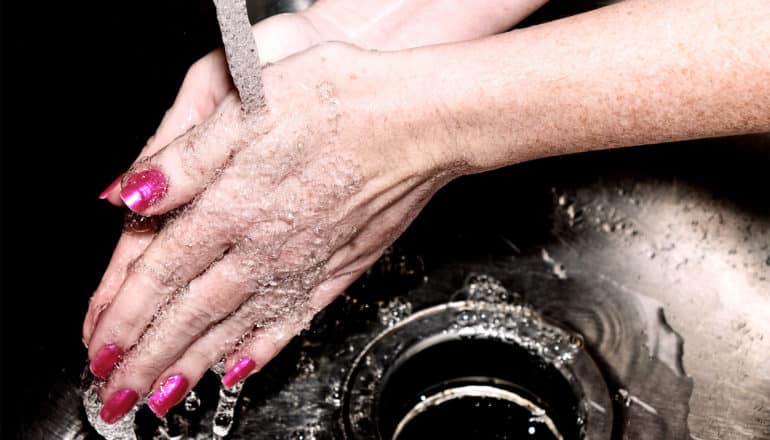
Avoiding panic, steering clear of sick people, and washing your hands are the most important things to do in preparation for COVID-19, experts say.
The outbreak of COVID-19, which began in China in December, has since migrated across borders and oceans to at least 47 countries and has resulted in nearly 3,000 global fatalities. Last week, world stock markets tanked over the economic fallout resulting from the spread of the virus.
But while experts caution that cases will rise here in the United States, they also caution against panic, especially as the federal Centers for Disease Control and Prevention says any immediate risk is low. To date, only about 60 people have contracted the virus in the United States, two-thirds of them travelers on a Diamond Princess cruise ship.
Some experts are feeding unnecessary public alarm by advocating that families assemble emergency kits of first aid, flashlights, candy, and battery-powered radios as a precaution, says John Connor, an associate professor of microbiology in Boston University’s School of Medicine and a researcher at the National Emerging Infectious Diseases Laboratory (NEIDL).
“Even if COVID-19 runs rampant in the United States,” says Connor, “I don’t see us reverting to radio stations and no power. Keeping extra candy bars around is a good idea, but just because life is always better with candy.
“I think that I would suggest that [people] leverage their existing online social networks to communicate if they become ill,” he says, “not to spark worry—and illness does not equal COVID 19—but as a way to minimize disease spread.”
Here are dos and don’ts to help you protect yourself, as suggested by medical and public health authorities:
Do:
- Reduce your stress. Countless studies have shown a correlation between stress and reduced immunity.
- Speaking of strengthening immunity, get a flu shot if you haven’t. It’s not too late.
- Take care of yourself by eating several servings of fruits and vegetables daily, drinking at least eight glasses of water daily, and getting eight hours of sleep.
- Wash your hands often, for at least 20 seconds, with soap and water or an alcohol-based hand sanitizer. Don’t wash just the palms and backs, but get in the crevices of the fingers. Be thorough.
- Cough into your sleeve or a tissue, not your hands.
- Avoid people who appear ill if possible. If you’re in a crowded space and someone is coughing, turn your back. It’s not rude. It’s smart. Try to put at least six feet between yourself and someone who has symptoms similar to that of the flu.
- Clean areas in your home, room, and any shared area that you touch often, such as door and sink handles and toilets, phones, computers, and water bottles.
- If you have a cough with fever (100.4 F or above), stay home or in your room, contact your healthcare provider, and remain isolated until you are without fever or the use of fever-reducing medicines for 24 hours.
- Buy a surgical mask if you are sneezing, coughing, or have a sore throat, even if you do not have a fever.
- Remember to make backup plans. If your children’s schools close, do you have contingent child care ready? Do you have a Plan B for working if public transit cuts back because of health concerns or if you have to stay late at work?
- Offer support and kindness to classmates and colleagues who may be affected by the coronavirus. The outbreak has fed anti-Asian prejudice.
Mohsan Saeed, an assistant professor of biochemistry and another NEIDL researcher, emphasizes the hands-washing and avoiding-sick-people tips. “These are the two most effective dos,” he says.
Don’t:
- Do not buy a surgical mask unless you have the symptoms mentioned above. Masks make the most sense for preventing infected people from spreading the virus, but they are not necessary for protecting the healthy.
- Do not buy a specialized, N95 respirator mask for filtering out airborne particles unless you get it fitted, tested, and receive training in its use. Otherwise, you’re wasting money.
- Do not spend unnecessary time in large groups or close to obviously sick people. It even makes sense to stay out of the middle of packed public transit vehicles. If public authorities announce an outbreak, stock up on necessities like food, prescriptions, and household items like diapers to minimize visits to grocery stores and contact with crowds of shoppers.
- Do not just stand there if someone coughs near you; turn away if possible.
- Do not be a Twitt-iot. Social media and other unreliable sources are spreading misinformation almost as fast as the coronavirus. Read only reliable sources like the CDC and the World Health Organization.
Source: Boston University
The post COVID-19: What you should and shouldn’t do now appeared first on Futurity.
from Futurity https://ift.tt/39odIVY
No comments:
Post a Comment